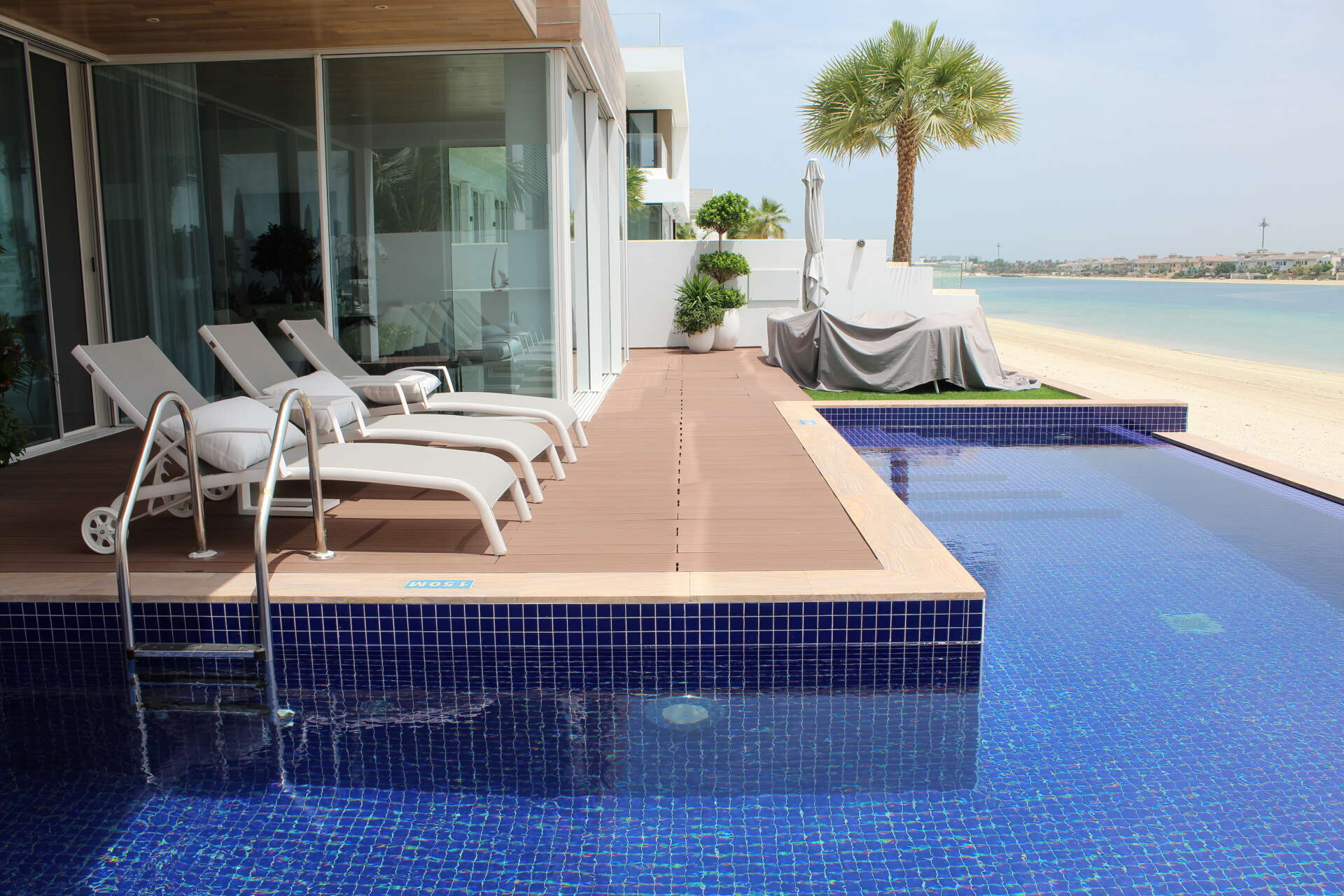

We all know the many advantages of having your own swimming pool in your backyard. Whether you opt for an in-ground or above-ground, salt-water or chlorinated, a pool offers hours of family fun and healthy outdoor exercise. However, with great pools, comes great responsibility. Yes, we’re talking about the regular pool maintenance tasks that need to be done to avoid costly repairs to your treasured swimming pool.
So, having had your ideal swimming pool installed, it’s not just a matter of chilling out on a recliner while you work on your tan or swimming laps every morning. Pool maintenance tasks can prove to be a time and labour-intensive process.
However, doing some basic and advanced pool maintenance tasks regularly can ensure you don’t have to fork out for pool repairs and that you keep your pool healthy and in good running order.
Pool Maintenance Tasks Any Pool Owner Can Do:
Check Your Water Level
Is your water level too high or are they too low? Your water level needs to be right at the centre level of your pool skimmer or pool tile for optimal results and peak performance. If your water level is too low, it can run the pump dry and eventually burn it out.
If your water level is too high, the skimmer door will not operate properly, potentially trapping debris in the skimmer and this is bad, very bad.
Water Balance, Cleaning, And Filtration
Check your pool chemistry once or twice a week during warmer months and once every one or two weeks in colder months. Your pool’s pH should be maintained between 7.2 and 7.8. The lower the pH on this scale, the less chlorine your pool will need.
Why? As pH rises, chlorine becomes increasingly less active. Continuing to add chlorine does not address the core ph issue. Chlorine at 7.0 pH is approximately only 50 percent active while at 8.0 this falls to around 10 percent active. Controlling pH properly allows you to use significantly less chlorine. Managing your ph will rid your pool of cloudy or irritating water.
Regularly test your pool water for the correct sanitizer level. You can sanitize your pool effectively by adding a sanitizer puck, salt water or other options that will quickly kill bacteria and algae in your pool.
You should also adjust the pH and alkaline levels. Balancers can help with this task, and make sure the correct levels are in the pool. Doing this will also, and help you save on expensive equipment.
Salt Systems
Salt systems provide a wonderful experience in the water, however, they can prove expensive to buy and maintain. If you have a salt system or salt pool, then avoid adding too much salt. If you can taste it, your pool is probably over-salted. If you fail to clean the salt cell in your saltwater pool you leave yourself open to incurring expensive repairs and even the need to replace the entire salt cell.
The cleaning process depends on how diligently you maintain your saltwater pool environment. If the saltwater pool you have is well maintained then you will only need to clean your pool every six to twelve months. There is one of the advantages of the new saltwater pool, which feature a self-cleaning function.
Skimmer Basket
Every few days check and scoop clear any debris from your skimmer basket. This will help to keep your pool water fresh and circulating properly. Handle your skimmer basket gently to avoid having to buy a new one.
Vacuuming The Pool
Vacuuming your pool, skimming leaves and other debris from the water, brushing your pool walls, and checking your filter and backwashing are regular maintenance tasks best done on an “as needed” basis.
Hair And Lint Pot
Clean the hair and lint pot pump every couple of weeks. This is the basket installed just inside the clear glass of your swimming pool pump. Turn off the pump and release the pressure on the system. Install a variable speed or two-speed pump to reduce this problem. Multi-speed pumps are well worth the initial expense.
Check Your Ozonator
If you have an Ozonator make sure its light is on and it is working. Ozone, as well as UV or a combination, can significantly reduce the amount of chlorine your pool uses. There are different types of Ozonator, each with its own installation and operation instructions.
Shocking Your Pool
Another weekly pool maintenance chore is to shock your pool water weekly to destroy combined chlorine compounds. A shock is a fast way to sanitize your pool while simultaneously raising the chlorine to the correct level.
If you need to shock your pool, do so at night. Use non-chorine-based shock if you plan on swimming soon after you shock your pool. Another option to shock your pool is to run your pump for 24 hours using your ozone system.
Other weekly tasks include adding algaecide, which kills existing algae without damaging or staining your pool.
Pool Pumps
One of the most expensive parts of any swimming pool system is the pool pump. It can suffer a mechanical breakdown. The pool pump acts as your in-ground swimming pool’s circulation system.
To extend the life of your pool’s pumps it is important you perform regular checks and clean the pool filter. Similarly, take special care to check the level of the water in your pool.
Due to mechanical wear and tear, parts of the pumps will inevitably need to be periodically replaced but regular checks will help prevent catastrophic failure.
Underwater Pool Lighting:
As with other bulbs in your home, the underwater bulbs in your pool eventually burn out and should be replaced. While this process is not particularly expensive, it is a regular occurrence. Opt for LEDs to reduce your power bill and the cost of replacements.
Pool Surrounds
Keep vegetation, animals, and fertilizers away from and out of your pool. Nitrates from bird droppings and waste from animals and people provide food for algae, while leaves and grass can foul your pool.
Request for A FREE Consultation NOW and Immerse Yourself In Infinite Blue!
Final Word
The key to having a healthy pool is to stay on top of your regular pool maintenance tasks. This will save you from mistakes that could prove to be expensive to repair later on. Routine pool maintenance also reduces the need to make those emergency dashes to the pool store for chemicals. Preventative maintenance goes a long way to reducing the lifecycle cost of your swimming pool and ensuring you spend the maximum time possible enjoying your pool.

